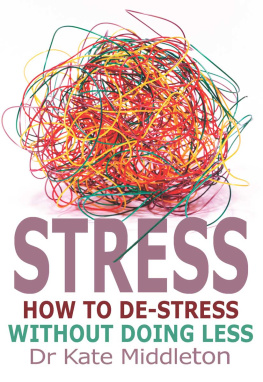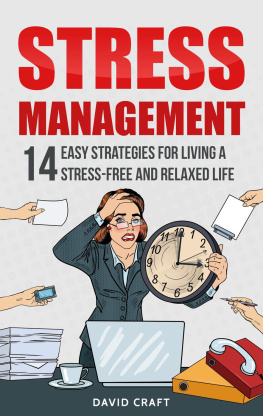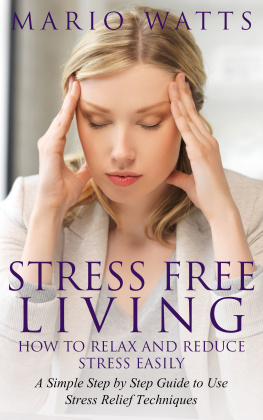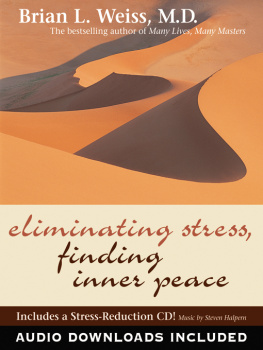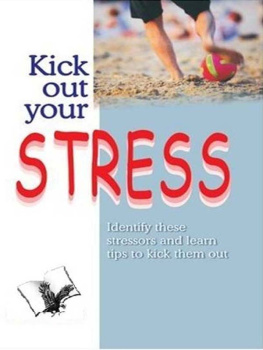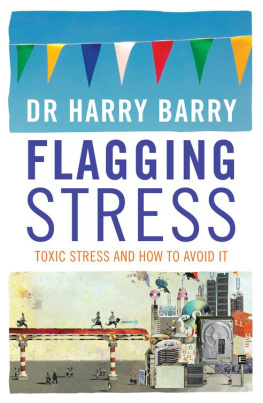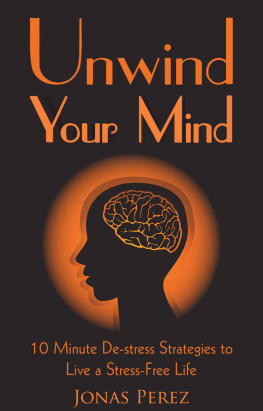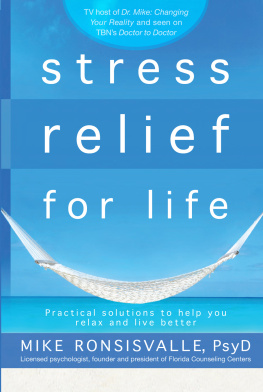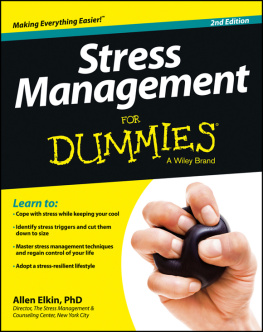STRESS
HOW TO DE-STRESS
WITHOUT DOING LESS
Dr Kate Middleton

Copyright 2009 Kate Middleton
This edition copyright 2009 Lion Hudson
The author asserts the moral right to be identified as the author of this work
A Lion Book
an imprint of
Lion Hudson plc
Wilkinson House, Jordan Hill Road,
Oxford OX2 8DR, England
www.lionhudson.com
ISBN 978 0 7459 5373 1 (UK)
ISBN 978 0 8254 7919 9 (US)
ISBN 978 0 7459 5997 9 (epub)
ISBN 978 0 7459 5996 2 (Kindle)
ISBN 978 0 7459 5998 6 (pdf)
Distributed by:
UK: Marston Book Services, PO Box 269, Abingdon, Oxon OX14 4YN
USA: Trafalgar Square Publishing, 814 N. Franklin Street, Chicago, IL 60610
USA Christian Market: Kregel Publications, PO Box 2607, Grand Rapids,
MI 49501
First electronic edition 2011
All rights reserved
Cover image: Roy Morsch/Zefa/Corbis
A catalogue record for this book is available
from the British Library
Contents
Part 1 Understanding stress:
What is stress and how might it affect you?
Part 2 All about you:
What makes some people particularly vulnerable to stress?
Part 3 Here and now:
How to deal with a high-stress life
Introduction
In my job I work with all kinds of different people, in lots of different situations in their workplace, in schools, in the community, at work and at home. As I share in peoples lives, I come across a variety of issues. Listening to them as they talk about their journeys, the things they have been through and the difficulties they are struggling with, has given me the opportunity and the privilege of sharing in many peoples experiences of what their own emotions can lead them to. I have learned a lot far more than I ever learned in any of my years of formal studying about what the things life throws at normal people can push them to: the extremes of emotions, difficulties with addictions, traumatic memories, and difficult and unhelpful beliefs about themselves and the world around them.
Writing this book has given me another opportunity to share some of the insights I have gained in my work. But if I am honest, writing this book has been very different for one key reason. Although I understand them very well, on the whole the issues I have covered in my previous books have been things that I do not struggle with myself. They are things I have learned about through sharing the experiences of others, through witnessing their struggles and applying the theory and fact that I already knew. This issue, however, is one that I readily confess I face day to day, like so many other people and no doubt like you, seeing as you are reading this book.
Stress is a modern-day plague, something that very few of us escape something that we probably all have to think about as it follows us every day. Stress is always there in the background, lurking behind us, following throughout our lives and ready to hit at moments we least expect it. Stress can take many forms and come from many sources. Like a lot of people, I am someone who likes to fill life with many different things. I like to achieve things, to accomplish things, to fit plenty into my days. Too easily I see things that need doing and take on the responsibility of doing them! But my own experience, starting with life as a medical student years ago, has taught me (though I have not been quick to learn it!) that if I do want to push myself that hard and achieve the things I aim for, I must not forget to make sure I handle stress well.
Stress can often be an unwanted companion along the road of life. We may not like it but its there! Too many people I have worked with have had months or years stolen by stress, or are facing the risk that they might have to give up things they love or stifle something of the person they are, because stress is having too serious an impact on them. We have to be sensible where stress is concerned. Finding the balance of how much we really can squeeze into life means we have to learn how to fight stress in the best way possible.
This book is about how to deal with stress how to reduce it where we can and live with it when we cant (we may as well accept it is unlikely to vanish completely). It is about how to stop stress from taking over our lives and ultimately taking bits of our lives from us. So join me on a lifelong journey of fighting this battle negotiating with stress and trying to come out as the winner!
PART 1
Understanding stress
WHAT IS STRESS AND HOW MIGHT IT AFFECT YOU?
1 Why worry about stress?
Stress, it seems, is everywhere! In fact, in my job, if there is one thing that ordinary people ask me about more than any other people of all ages, from all walks of life, people working, people bringing up children, people with worries for themselves and people who are worried about others its stress! It doesnt take long if you are reading the daily papers, scanning the news channels or reading reports on the internet to find something referring to stress something that has triggered stress, the impact stress has on a situation or on certain people, the medical or psychological impact of stress Stress has become something that almost everyone seems to be concerned about, yet, at the same time, something that we all feel we are at the mercy of. If you get a group of friends together to chat about how their life is going, it wont be long before stress comes up. Stress is a key issue in the workplace, where managers are expected to think about how the jobs they give people impact on them in terms of stress. It is discussed at schools, where teachers now often find they need to introduce programmes designed to help pupils cope with stress, as well as teaching them the usual subjects. Even very young children are not immune, with recent findings that even pre-school children can be affected by stress, leading some nursery schools to introduce yoga and relaxation classes for toddlers. As one mum said to me recently, How stressed can you be by four years old?
So, just how big an issue is stress?
Are media reports highlighting a genuine problem, or are we just making too big a deal out of something that decades ago people would just have got on with? Are stress levels really rising, and how should we be responding to the apparent tidal wave of related problems? Concerns over rising stress levels in the UK have even led to warnings from politicians of a epidemic of mental distress. Should we be concerned?
There is certainly plenty of evidence showing apparent problems linked to or caused by stress. Research shows that one in three adults feels stressed every day, with younger adults feeling the pressure most around half of people in their early twenties say that they feel under pressure most days. Stress has been linked to all kinds of physical problems including heart disease, problems with skin conditions such as eczema, and sleep problems. One study even found that women working in stressful jobs were more likely to start the menopause earlier than their more chilled-out colleagues.
Stress has also been linked to problems with mental health and emotional illnesses such as anxiety and depression. One study looking at a group of people in their early thirties found that work stress was related to the start of problems with depression and anxiety in 45 per cent of cases. The people studied worked in a wide variety of professions, but all reported stresses such as long hours, lack of control over their work and tight deadlines. About one person in four develops a new problem with anxiety or depression in any given year, but it seems the risk is doubled if you work in a high-pressure job.

